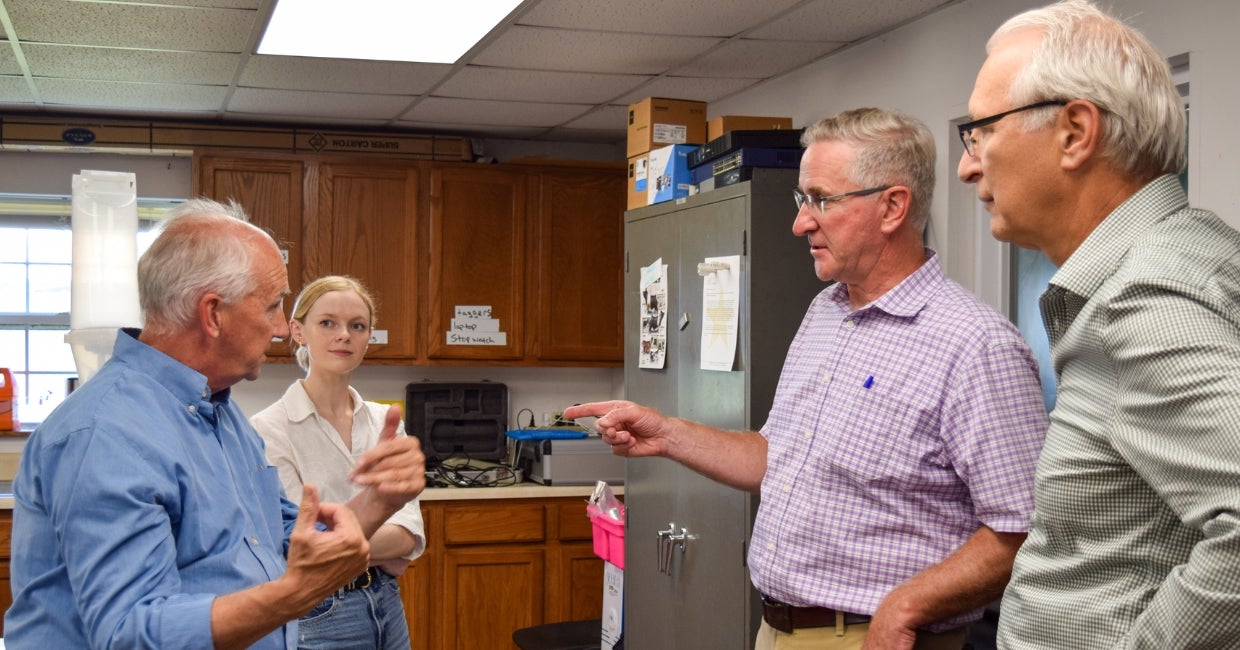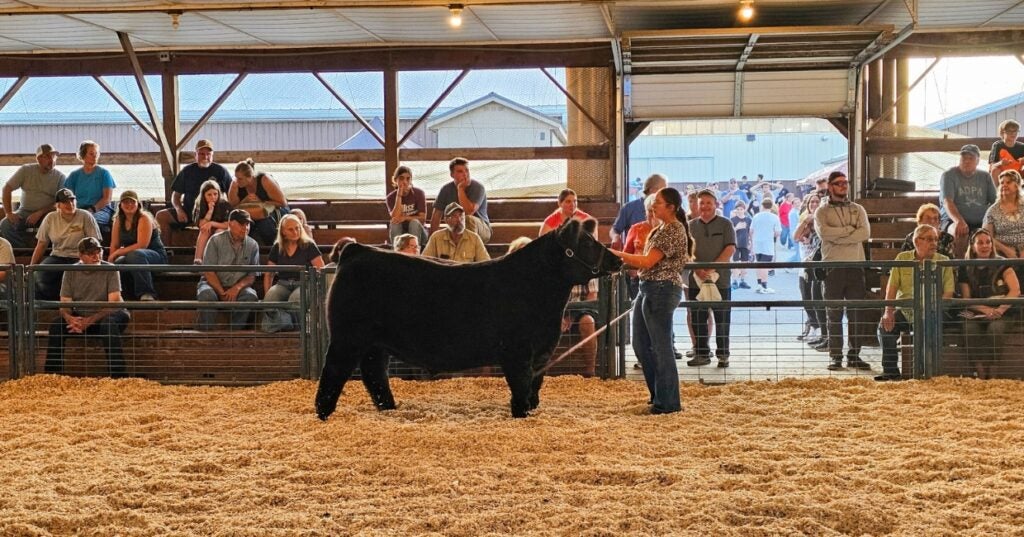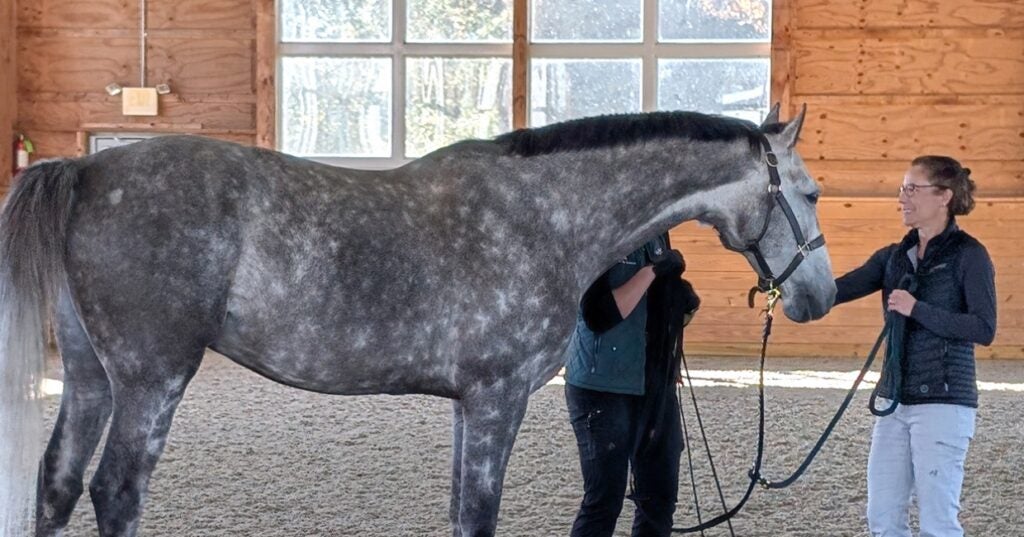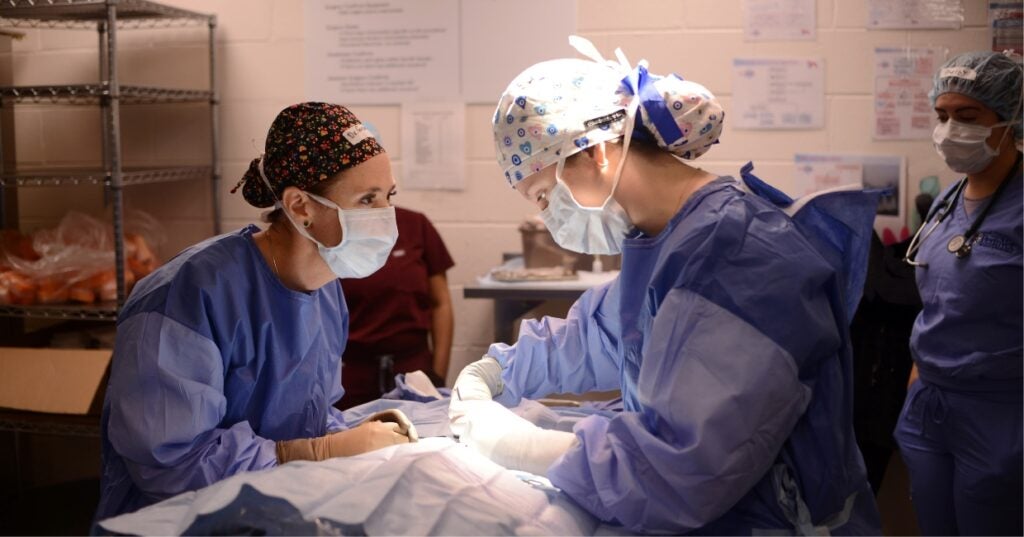Penn Vet professor Thomas Parsons and Philadelphia-based tech firm AgriGates receive inaugural state innovation grants

A professor at the University of Pennsylvania’s School of Veterinary Medicine (Penn Vet) who has pioneered a more efficient, humane way to feed mother pigs and a Philadelphia firm that is turning technology into a next-generation tool for raising and managing livestock are among the first recipients of Pennsylvania’s newly created Agricultural Innovation Grants.
Together, they have formed a partnership that is harnessing advances like AI and machine learning to make new discoveries about swine behavior that will benefit state farmers and impact farming practices.
Thomas D. Parsons, Marie A. Moore Endowed Chair and director of Penn Vet’s Swine Teaching and Research Center, and Daniel Foy, co-founder and CEO of the tech firm AgriGates were both honored Wednesday by state Agriculture Secretary Russell Redding at Penn Vet’s New Bolton Center as local recipients of the inaugural grant program.
“Investments in innovation like the ones we are seeing today are essential to keeping Pennsylvania agriculture strong, healthy, competitive, and future-ready,” said Redding. “With industry partners such as AgriGates and Penn Vet’s New Bolton Center, we are ensuring the long-term success and vitality of Pennsylvania’s agriculture industry. Thanks to the leadership of Governor Shapiro and the strong support of the General Assembly, we’re making it possible for farmers to modernize their operations, improve sustainability, and create jobs in rural communities.”
The state awarded $10 million, out of $68 million in competitive funding requests, to 88 innovators from 45 counties that best put forth cutting-edge solutions and technologies to move Pennsylvania agriculture into the future.
Andrew Hoffman, Penn Vet’s Gilbert S. Kahn Dean of Veterinary Medicine, who attended the New Bolton Center event and delivered opening remarks, thanked Governor Shapiro, Secretary Redding, and his team for their support and recognition of the innovative spirit of farmers and veterinarians in the Commonwealth.
“We will continue to be fearless in our innovation and focus on the public benefits of science,” said Hoffman. “In agriculture, we will continue to be intrepid innovators in a variety of key areas of sustainability in animal agriculture.”
“It is a privilege to serve the Commonwealth and its agriculture industry, and to take this journey together,” Hoffman added. “We congratulate Dr. Parsons, Mr. Foy, and their collaborators on these novel projects.”
Parsons and Foy, who each received $31,000, are using the grant in combination with state funding from the Center for Poultry and Livestock Excellence to further their joint research.
“We are very humbled and flattered to be one of the awardees of Pennsylvania’s inaugural Agricultural Innovation Grant program,” said Parsons, who also serves as director of Penn Vet’s Center for Stewardship Agriculture and Food Security. “It creates opportunity. We are really excited about what it allows us to do.”
For over 20 years, Parsons and his research teams have focused on the implementation of Electronic Sow Feeding (ESF) systems, which deliver precise and individualized nutrition to sows in group housing environments. The systems use radio-frequency identification tags to identify each sow and provide the amount of feed needed by the individual animal. Used largely with pregnant sows, it helps cut feed waste and ensure proper nutrition for the animals.
And since the sows feed individually, more timid animals are not subject to food-motivated aggression from other sows. They can also live in groups, rather than isolated in stalls, which is less confining and enhances the well-being of the pigs.
More efficient farming, healthier nursing sows
Parsons’ new work, which won Commonwealth support and recognition, is an electronic feeding system for nursing sows.
“That’s probably when they have the most nutritional needs,” Parsons said. “This is an important time to be able to drill down and really fine-tune what we feed them and how we feed them.”
Lactating sows require two to five times as much feed as sows not lactating, depending on the number of piglets they are feeding, and their nutrition needs to be spread out over the course of each day, Parsons explained.
With the ESF, nursing sows can self-feed, and the computerized system supplies each animal with the exact amount of nutrition they individually need at the proper intervals. The system can also be used to automatically feed the individual animals the correct amount of feed at specified intervals.
The EFS system for lactating sows also provides data that can enable better and more efficient farm management, he added, including improved animal nutrition.
“It’s this expanding role of technology to help farmers be better at what they do, which ultimately translates into a more profitable business, but also better care for the animals,” he said.
Technology like AI advancing insights into animal behavior
Philadelphia-based AgriGates sought its state innovation grant to further develop high-tech sensors and machine learning-based behavioral insight systems to study swine welfare and management.
“We got the Ag Innovation Grant from the state to help set up a sensor lab so we can build more sensor tools that could be deployed at research institutions and farms, so we can collect high-quality data,” Foy said.
Parsons and Foy are already engaged in doing just that with the swine at New Bolton Center. Sensors that work like a porcine Fitbit are affixed to the swines’ ears, allowing the researchers to collect 17 million data points per day about the animals’ movements and behaviors and do research that would not be possible by observation alone, according to Foy. “This combination of Fitbit data and video data represents a new approach to training AI.”
The intent of their ongoing collaborative research is to develop information that will eventually be used by farmers to support agriculture and animal welfare through better care, according to Foy.
“It’s the new frontier of precision livestock farming – understanding the animals,” he said. “How do we track and understand them individually at a higher fidelity? It is going to allow us to do precision medicine, precision genetics, and precision management in a new way.”
Later in the day, Redding and his staff, along with members of the Penn Vet community, got to see the technology in action at New Bolton Center’s swine research center.
Some of the visitors saw their own movements tracked by the same data-generating devices that are now allowing the researchers to study pig behavior.
In a room that looked like the center’s command central, they got a sense of the volume of data generated by the pigs’ wearable devices, along with specific information about how much feed each sow was consuming that day. A below-average amount might signal a health problem to look into, or just a temporary lagging appetite.
“We have seen data that they are more efficient when they feed themselves,” Parsons said. And since Parsons’ state honor was for his innovation in feeding lactating sows, the visitors got a special visual treat: lots of newborn, nursing piglets. Their sows’ nutrition was a cutting-edge, next-generation display, but mealtime for those babies was still all mom.
Related News

New Bolton Center Surgeons Come Through for Howee the Steer and his Girl
Mallie Touchton was always a farm animal kid. Since she was 8, Mallie was raising and showing her own market livestock – pigs, goats, and dairy calves. Even though she…

Behind the Breakthroughs: Amy Johnson
Balancing clinical care with scientific inquiry, Penn Vet’s Amy Johnson leads efforts to decode the complexities of neurologic diseases in horses

Penn Vet’s Enhanced Approach to Teaching Primary Care Surgery Aims for Career-Ready Graduates
Brooklyn, a white Maltese dressed for warmth in a green frog hoodie, lay in anesthetized slumber under the bright lights of Ryan Hospital’s junior surgery suite. On one side of…
About Penn Vet
Ranked among the top ten veterinary schools worldwide, the University of Pennsylvania School of Veterinary Medicine (Penn Vet) is a global leader in veterinary education, research, and clinical care. Founded in 1884, Penn Vet is the first veterinary school developed in association with a medical school. The school is a proud member of the One Health initiative, linking human, animal, and environmental health.
Penn Vet serves a diverse population of animals at its two campuses, which include extensive diagnostic and research laboratories. Ryan Hospital in Philadelphia provides care for dogs, cats, and other domestic/companion animals, handling more than 30,000 patient visits a year. New Bolton Center, Penn Vet’s large-animal hospital on nearly 700 acres in rural Kennett Square, PA, cares for horses and livestock/farm animals. The hospital handles more than 6,300 patient visits a year, while our Field Services have gone out on more than 5,500 farm service calls, treating some 22,400 patients at local farms. In addition, New Bolton Center’s campus includes a swine center, working dairy, and poultry unit that provide valuable research for the agriculture industry.

